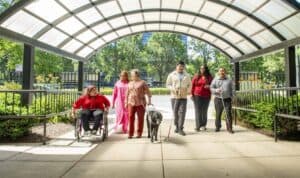Q&A with Laura Hayes, Director of Occupational Therapy
What inspired you to choose your career path?
I always knew when I was younger that I wanted to be involved in some sort of helping profession. And then in college, I decided to study psychology because I very much liked working with people and being around people. Fast forward to the end of college, I was introduced to the profession of occupational therapy, I felt that it might be just the perfect fit for me.
What do you do at The Lighthouse?
My role as an occupational therapist at The Lighthouse is to specifically address the functional side of living for somebody who is dealing with a vision impairment. And so, while we’re not able to necessarily restore their vision, we want to empower them on how they can live through different adaptations, and different adaptive strategies so that they’re able to continue to engage in activities that are meaningful to them. So that might be how to functionally use a magnifier so that they can read the directions on a food label. Or it might be applying tactile markings to different appliances in their kitchen, or in their homes that they’re able to activate them. Occupational therapy is also really founded on principles of being individualized to the person so every patient that comes to us may have different goals.
What do you like most about working at The Lighthouse?
I do provide a lot of patient direct care, still in my role as a director, and it is the part of my day that honestly gives me the greatest satisfaction and continues to really light me up and want me to kind of continue coming back to the job.
What are you most proud of accomplishing?
For me, it’s more what stands out is being able to watch people through their journey with low vision, rehabilitation, sort of where they might start. I feel like when I’ve had the greatest success are the patients that are able to emerge from everything with a perspective of obviously, there’s been loss that comes with having a vision impairment, but also feeling like they’ve had a gain from their experience at The Lighthouse and that they know that just because they have a vision impairment doesn’t mean that they can’t continue to engage in activities that are meaningful to them.


